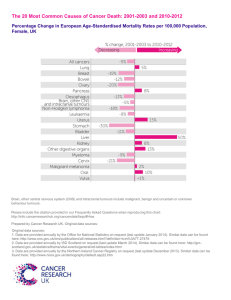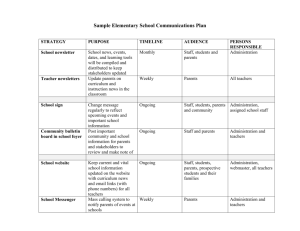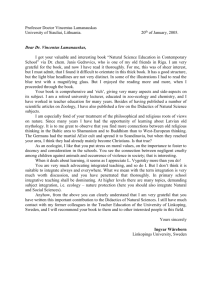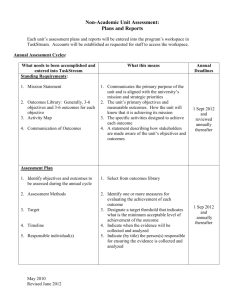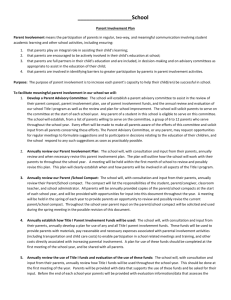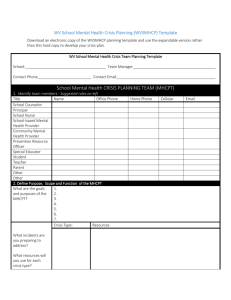Curriculum Template
advertisement
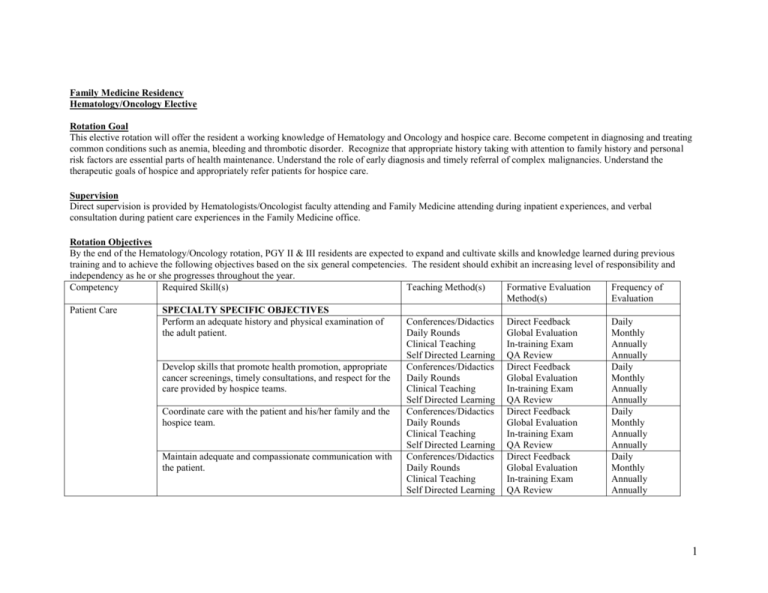
Family Medicine Residency Hematology/Oncology Elective Rotation Goal This elective rotation will offer the resident a working knowledge of Hematology and Oncology and hospice care. Become competent in diagnosing and treating common conditions such as anemia, bleeding and thrombotic disorder. Recognize that appropriate history taking with attention to family history and personal risk factors are essential parts of health maintenance. Understand the role of early diagnosis and timely referral of complex malignancies. Understand the therapeutic goals of hospice and appropriately refer patients for hospice care. Supervision Direct supervision is provided by Hematologists/Oncologist faculty attending and Family Medicine attending during inpatient experiences, and verbal consultation during patient care experiences in the Family Medicine office. Rotation Objectives By the end of the Hematology/Oncology rotation, PGY II & III residents are expected to expand and cultivate skills and knowledge learned during previous training and to achieve the following objectives based on the six general competencies. The resident should exhibit an increasing level of responsibility and independency as he or she progresses throughout the year. Competency Required Skill(s) Teaching Method(s) Formative Evaluation Frequency of Method(s) Evaluation Patient Care SPECIALTY SPECIFIC OBJECTIVES Perform an adequate history and physical examination of Conferences/Didactics Direct Feedback Daily the adult patient. Daily Rounds Global Evaluation Monthly Clinical Teaching In-training Exam Annually Self Directed Learning QA Review Annually Develop skills that promote health promotion, appropriate Conferences/Didactics Direct Feedback Daily cancer screenings, timely consultations, and respect for the Daily Rounds Global Evaluation Monthly care provided by hospice teams. Clinical Teaching In-training Exam Annually Self Directed Learning QA Review Annually Coordinate care with the patient and his/her family and the Conferences/Didactics Direct Feedback Daily hospice team. Daily Rounds Global Evaluation Monthly Clinical Teaching In-training Exam Annually Self Directed Learning QA Review Annually Maintain adequate and compassionate communication with Conferences/Didactics Direct Feedback Daily the patient. Daily Rounds Global Evaluation Monthly Clinical Teaching In-training Exam Annually Self Directed Learning QA Review Annually 1 Make recommendations for appropriate screenings for malignant conditions. Recognize and appropriately refer a patient for hospice care. Medical Knowledge SPECIALTY SPECIFIC OBJECTIVES Gain adequate knowledge of the common hematological and malignant disease of the adult patient. Develop and apply knowledge of the criteria for hospice admission to patient care. Develop and demonstrate understanding of oncologic emergencies Structural or obstructive (e.g., SVC syndrome) Pericardial effusion and tamponade Spinal cord compression Emergency paraneoplastic syndrome- see above, including adrenal insufficiency Febrile neutropenia Tumor lysis syndrome Develop and demonstrate understanding of Paraneoplstic syndromes Hypercalcemia, SIADH, Cushing’s, acromegally, gynecomastia, hypoblycemia Neuroligc- metastatic, infectious, complications of chemotherapy, metabolic and paraneoplastic (autoimmune?) Develop and demonstrate knowledge of specific cancers including but not limited to: ENT Conferences/Didactics Daily Rounds Clinical Teaching Self Directed Learning Conferences/Didactics Daily Rounds Clinical Teaching Self Directed Learning Direct Feedback Global Evaluation In-training Exam QA Review Direct Feedback Global Evaluation In-training Exam QA Review Daily Monthly Annually Annually Daily Monthly Annually Annually Conferences/Didactics Daily Rounds Clinical Teaching Self Directed Learning Conferences/Didactics Daily Rounds Clinical Teaching Self Directed Learning Conferences/Didactics Daily Rounds Clinical Teaching Self Directed Learning Direct Feedback Global Evaluation In-training Exam QA Review Direct Feedback Global Evaluation In-training Exam QA Review Direct Feedback Global Evaluation In-training Exam QA Review Daily Monthly Annually Annually Daily Monthly Annually Annually Daily Monthly Annually Annually Conferences/Didactics Daily Rounds Clinical Teaching Self Directed Learning Direct Feedback Global Evaluation In-training Exam QA Review Daily Monthly Annually Annually Conferences/Didactics Daily Rounds Clinical Teaching Direct Feedback Global Evaluation In-training Exam Daily Monthly Annually 2 Lung- non small cell, small cell Breast- genetics, diagnosis, staging, treatment GI tumors- esophageal, gastric, small bowel, colonic polyps, colorectal and anal cancer, pancreas, hepatocellular, endocrine Genitourinary-bladder, renal, testicular, ovarian, endometrial, cervical, prostate Cancer of unknown primary site Develop and demonstrate an understanding of Lymphoid malignancies including: CLL- B cell Lymphomas- indolent, aggressive, non-Hodgkin’s ALL- including lyphoblasic lymphoma, Burkitt’s acute T-cell leukemia Plasma cell disorders- multiple myeloma, MCG Hodgkin’s disease Develop and demonstrate knowledge of bleeding and thrombotic disorders including: Platelet disorders- thrombocytopenia, thrombocytosis, platelet dysfunctions Blood vessel wall defect- TTP, HUS, HSP Disorders of blood coagulatins- congenital (e.g., Hemophilia A and B, von Willebrand’s disease,) and acquired (e.g., vitamin K deficiency, liver disease, DIC, circulating anticoagulatns) Thrombotic disorders- hypercoagulable state, including protein C and S deficiencies, antithrombin 3 deficiency, factor 5 Leiden mutation Develop and demonstrate an understanding of Red blood cell disorders Anemia- hypoproliferative, maturation disorders, RBC destruction of blood loss (e.g., blood loss, hemolysis.) Polycythemia SS aneamia- impaired growth, infectious complications, vasocclusive (e.g., stroke,) aplistic crisis, acute chest syndrome, iron overload, fever, use Self Directed Learning QA Review Annually Conferences/Didactics Daily Rounds Clinical Teaching Self Directed Learning Direct Feedback Global Evaluation In-training Exam QA Review Daily Monthly Annually Annually Conferences/Didactics Daily Rounds Clinical Teaching Self Directed Learning Direct Feedback Global Evaluation In-training Exam QA Review Daily Monthly Annually Annually Conferences/Didactics Daily Rounds Clinical Teaching Self Directed Learning Direct Feedback Global Evaluation In-training Exam QA Review Daily Monthly Annually Annually 3 of hydroxyurea Develop and demonstrate an understanding of Myelopropliferative syndromes- ppolycythemia vera, myelofibrosis, essential thrombocytosis Practice Based Learning and Improvement Develop and demonstrate an understanding of White blood cells disorders Leukocytosis- neutrophilia, leukemoid reaction, leudoerythroblastic reactions, lymphocytosis, monocytosis, eosinophilia, bsophilia Leukopenia- neytrophenia, febrile neutropenia Clonal malignancies- AML, CML, myelodysplasia SPECIALTY SPECIFIC OBJECTIVES See General Family Medicine Objectives for a comprehensive list. Develop tools to help meet the needs of patients Incorporate evidence based medicine and resources into the care of hematology/oncology patients. Review current literature relevant to the care of individual patients and the community. Interpersonal and Communication Skills SPECIALTY SPECIFIC OBJECTIVES See General Family Medicine Objectives for a comprehensive list. Communicate effectively with patients and their families while in the presence of their daily preceptor. Convey information in a clear and concise manner to patients, families, and other health professionals (i.e., use Conferences/Didactics Daily Rounds Clinical Teaching Self Directed Learning Conferences/Didactics Daily Rounds Clinical Teaching Self Directed Learning Direct Feedback Global Evaluation In-training Exam QA Review Direct Feedback Global Evaluation In-training Exam QA Review Daily Monthly Annually Annually Daily Monthly Annually Annually Conferences/Didactics Daily Rounds Clinical Teaching Self Directed Learning Conferences/Didactics Daily Rounds Clinical Teaching Self Directed Learning Conferences/Didactics Daily Rounds Clinical Teaching Self Directed Learning Direct Feedback Global Evaluation In-training Exam QA Review Direct Feedback Global Evaluation In-training Exam QA Review Direct Feedback Global Evaluation In-training Exam QA Review Daily Monthly Annually Annually Daily Monthly Annually Annually Daily Monthly Annually Annually Conferences/Didactics Daily Rounds Clinical Teaching Self Directed Learning Conferences/Didactics Daily Rounds Direct Feedback Global Evaluation In-training Exam QA Review Direct Feedback Global Evaluation Daily Monthly Annually Annually Daily Monthly 4 Professionalism appropriate vocabulary choice, realistic outcomes, and working with difficult patients and family) SPECIALTY SPECIFIC OBJECTIVES See General Family Medicine Objectives for a comprehensive list. Provide compassionate care to all patients regardless of gender, age, culture, race, religion, disabilities, sexual orientation or socioeconomic class Provide high quality medical care to all patients regardless of gender, age, culture, race, religion, disabilities, sexual orientation or socioeconomic class. Behave in a professional manner when interacting with patients or other health care providers. Systems-Based Practice SPECIALTY SPECIFIC OBJECTIVES See General Family Medicine Objectives for a comprehensive list. Develop an understanding of the role of various ancillary modalities of patient care that are available including hospice care, physical and occupational therapy, speech therapy, wound care, nutritional education and pastoral care. Clinical Teaching Self Directed Learning In-training Exam QA Review Annually Annually Conferences/Didactics Daily Rounds Clinical Teaching Self Directed Learning Conferences/Didactics Daily Rounds Clinical Teaching Self Directed Learning Conferences/Didactics Daily Rounds Clinical Teaching Self Directed Learning Direct Feedback Global Evaluation In-training Exam QA Review Direct Feedback Global Evaluation In-training Exam QA Review Direct Feedback Global Evaluation In-training Exam QA Review Daily Monthly Annually Annually Daily Monthly Annually Annually Daily Monthly Annually Annually Conferences/Didactics Daily Rounds Clinical Teaching Self Directed Learning Direct Feedback Global Evaluation In-training Exam QA Review Daily Monthly Annually Annually Educational Resources www.UpToDate.com Harrison’s textbook of Internal Medicine PEPID Primary Care Plus online evidence based patient care tool www.UPSTF.com 5
